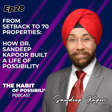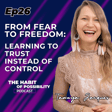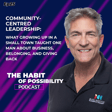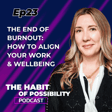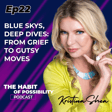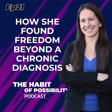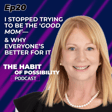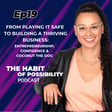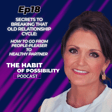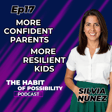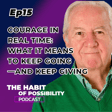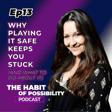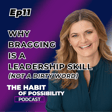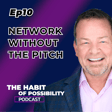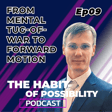Fear of Rejection and Anxiety
00:00:00
Speaker
I had a lot of fear. I didn't want to be rejected by women. i was really afraid of consequences of making women angry. it was really coming from that place of fear.
00:00:12
Speaker
Part of this fear was also just feeling like I was lesser than. would usually see myself as lesser than. When as soon as you believe there is a lesser than, you also believe there's a greater than. And both of those are just not real. Both of those just aren't real.
Truth Behind People-Pleasing
00:00:31
Speaker
Have you ever found yourself saying yes when you really wanted to say no? Or replaying a conversation in your head worrying you upset someone? In this episode, we dive into the surprising truth about people-pleasing and what it's really doing to your relationships.
Jillian's Experience with People-Pleasing
00:00:48
Speaker
Our guest is Jillian Verwarn, the director of Hypnosis Niagara. She's going to share with us her experience with being a people pleaser and how much better her life and relationships are now that she has learned to let go of the need to please.
00:01:04
Speaker
Hello everybody, this is Robbie Spear-Miller, the host of the Habit of Possibility podcast. And today I'm really excited to have a very interesting conversation with Jillian Berlorn, who is the director of Niagara Hypnosis and is a mentorship student here. We've done a lot of training together for a number of years.
00:01:22
Speaker
And the topic we're going to explore together is the changes that Jill made in terms of her relationships with people, especially with women. And if you get curious and kind of float up above your own life, you might observe that you have different types of responses to men than to women. And different people have different responses, but it's very common that there's a shift there for people.
00:01:48
Speaker
And so Jill had a very dramatic version of this. And we're going to talk about how she managed to shift it so that now she she used to associate a lot of pleasure and pain with women. It was kind of an adventure because she was imagining that even though she loves women and and wanted to connect, she was also imagining they were competing with her or wanting to judge her.
00:02:13
Speaker
And that was Jill putting on glasses that were seeing things that way. It wasn't, some women do do that, but she was projecting that onto the women. So we're going to talk about this and explore how that changed and what Jill realized as
Fear's Impact on Relationships
00:02:29
Speaker
a result. So welcome, Jill.
00:02:31
Speaker
Well, thanks for having me. Yeah, thanks for coming. I never thought I was going to have a conversation like this, that's for sure. you You probably didn't even see this was happening, right? No. You just thought this is the way it is and this is who you are in the world.
00:02:52
Speaker
You didn't really even see the pattern before. i Well, I just thought this was the way the world was. right i just thought that this was the way everyone experienced it um i didn't have any uh reason to believe otherwise and um and my mind was constantly reinforcing that by by you know having that filter on to see it like being reinforced that way over and over again so thank goodness thank goodness it can be different
00:03:22
Speaker
Yeah, well, why don't you share a little bit about how it used to imp impact you when you looked at things this way? How did it limit you I'd say that, so like the biggest thing um to note here is that I always wanted ah to be liked by women.
00:03:42
Speaker
I was, I saw like, I was, ah I had a lot of fear. I didn't want to be rejected by women. i was really afraid of consequences of making women angry.
00:03:54
Speaker
um in particular. So it's it was like it was really coming from that place of fear more than anything. It was coming from a place of fear. And I want to highlight that because it it's not like I thought people were trying to be mean or I thought they were evil or you know or whatever.
00:04:13
Speaker
it was more just that I thought um that it was a real it was a real danger to watch out for. Like a fact of life. Yeah, it was just like, it was like a scary fact of life that, oh, you know, because I, and in my experience, I would, I'd have, I had all these memories of like hearing women like talk negatively about each other or, or like, you know, be really backstabby or, you know, like, like do really horrible, cruel things. And I would, you know, like I went through a lot of bullying as well, like, um,
00:04:51
Speaker
which I think a lot of people can relate to, ah but it it created this false belief and assumption that that was just the way it was in the world. And it made, and it really skewed the way I entered was able to interact with with people and especially men and women.
00:05:11
Speaker
And so it's interesting that you say this, because I also used to I always liked men more than my men, right? Even though I wanted to be friends with women, I can relate to what you're saying. And I think that some of this is that as people mature in life, this issue isn't as big as it is when you're younger,
00:05:31
Speaker
right because when kids are a little, you know, kids are kids and they do all kinds of things. And, you know, the the veneer is off. There's no, a you know, ways that people ah have a mature view of life when they're young.
00:05:46
Speaker
And so I think it's very common for a lot of women to have these types of experiences and it can appear to be the way it is. And my experience has been that I know a lot, a lot of women now in my life and I'm friends with a whole lot of women or acquaintances and And they're awesome, right? And it's not that that some of them aren't competitive or some of them don't gossip.
00:06:09
Speaker
I'm sure they do, right? For sure, there's some of that. But there are also lots of amazing, giving, supportive people. And when we expect everybody to be more like a bully or gossip or stab us in the back, then we we actually create those situations in our lives or we attract those people into our lives and then we think that's all there is.
Subconscious Fears in Relationships
00:06:33
Speaker
And I sometimes think of it like, um like I love dogs a lot. And whenever i i go out for a walk, I love seeing the way the dogs come up to you and they want to be pet and they're so friendly.
00:06:49
Speaker
and ah But then I'll like go on a walk with a friend who's afraid of dogs. And somehow exactly the same dogs will bark, right? It'll they'll bark to the at the at the person who's afraid of the dog. And I was like, that's really cool.
00:07:03
Speaker
And it's kind of like, and it's reinforcing that fear and or the or whatever belief is in that person of like, oh, dogs just don't like me. Dogs are... yeah unpredictable, whatever whatever belief is actually causing it to happen.
00:07:20
Speaker
But really really, the dogs are just picking up on the fact that this person's uncomfortable and they're perceiving it as a threat. Yep. And dogs subconsciously know that. And as people, as humans, we do too, even though we might not rationally know that.
00:07:35
Speaker
And so there there's so many things that happen in life that we can't quite put our finger on, where you see patterns and you don't really know why it's happening, but it's because of that that subconscious communication.
00:07:48
Speaker
Absolutely. So like, I do wanna like really emphasize the fact that I truly believed, um I truly, truly believed that I loved loved women and have always loved women, right?
00:08:04
Speaker
ah And it was like, wanna emphasize the the fact that it was, I was always inspired by women. I thought they were amazing.
00:08:15
Speaker
you know, like I wanted to be accepted and part of the group. But ah part of this fear was also just feeling like I was lesser than or like I would often see myself as lesser than.
00:08:27
Speaker
would usually see myself as lesser than. But when as soon as you believe there is a lesser than, you also believe there's a greater than. And both of those are just not real.
00:08:39
Speaker
Both of those just aren't real. and it And it leads down weird, um like just weird thinking of hierarchies and structures that way, um which makes it just difficult to see reality anyways.
00:08:55
Speaker
It is. And some of these patterns really do happen, and right? So we don't want to say that everybody is, you know, and a sweet, sugar and spice and everything nice.
00:09:06
Speaker
um but But it's more being able to see what is actually happening instead of just projecting our old way
Compulsion in Hypnosis and Relationships
00:09:14
Speaker
over and over. Because Jill, what you're describing is in hypnosis, what we call a compulsion, where you've been associating pleasure and pain with the same thing. And there's a thrill to it.
00:09:24
Speaker
like going on a roller coaster, right? Or like, you know, yeah any habits people have, like even if somebody bites their nails, they might bite their nails to relax or to escape.
00:09:36
Speaker
But yet they don't like that their nails look all rough and dirty and the the way it makes them feel, right? Right. when in terms of women, you were, you had a compulsion and you can't, when, when there's a compulsion, it's hard to, to like, you want it, you want it.
00:09:54
Speaker
And then there's the pain associated with it. And so it creates a trap for people where they can't actually interact with things in a healthy way. Which, you know, and when, in one respect makes it really difficult to connect.
00:10:10
Speaker
It makes it damn near impossible to connect. To genuinely connect. To genuinely connect and and have those friendships. And so, and then when you would have those friendships, they would have like an intensity to them that was also kind of weird.
00:10:25
Speaker
um So it would be like, I finally found one! Kind of like over, like overly um attached. Like I'd sometimes like just really like have an intensity to a friendship, like, oh my gosh, this is my friend. And, you know, like really like being really, really attached to them.
00:10:50
Speaker
ah Or like just wanting just wanting so badly for it to work out. Like wanting so badly. And so there's always that like weird intensity around it, which is kind of stressful for, you know, the person and also for me. um and And so it was like the thing I was afraid of was being created. It was like the self-fulfilling prophecy um just by having that intensity. So was like even if it was good, it wasn't good.
00:11:22
Speaker
that You were always waiting for the other shoe to drop. Possibly. And in a way, the better it was, the more risky it seemed. The more it would hurt, yeah.
00:11:34
Speaker
Yeah, the more it would hurt if that other shoe did drop. And you were just expecting it to happen at some point. And then you were yeah hi looking for approval to prevent it, but that kept you from being authentic and real with the person.
00:11:52
Speaker
If you're enjoying this podcast, please like and follow us and post a review so other people can find us too.
Overthinking and Anxiety in Social Settings
00:12:01
Speaker
Yeah. So like not wanting to do anything that might offend them, kind of overthinking interactions after the fact and being like, oh no, like weird anxiety about going out to interact.
00:12:15
Speaker
And then also ah just isolating. because it felt like it was easier than reaching out. and And sometimes I would go silent, like um accidentally ghosting people for sometimes months.
00:12:28
Speaker
Like not on purpose, not at all. It was just like like distracting away from it so that because it there was there was too much tension to it. Yeah, it felt raw and vulnerable, and it was too much.
00:12:41
Speaker
You didn't want to go there. Yeah. Yeah. Yeah. and I think this is an important thing to explore because whenever we have relationships with anyone, right, men, women, whatever, right, whatever combo of relationships we're having, and that when it matters to us, usually it's bringing out some neediness um that we haven't healed up from when we were younger.
00:13:09
Speaker
So there were things that you needed to heal up in you and let go of to be safe with women. And by recreating the same risky, compulsive situation over and over again and projecting your old experience on them, and instead of healing them up, you were giving yourself more and more evidence that this is just the way it is.
00:13:30
Speaker
And so I think a lot of people do that. Like I've had clients who um they choose friends or romantic partners in their lives who are very critical.
00:13:41
Speaker
And in their mind, they're thinking, well, I need people like they were attracted to people who are super judgmental and critical because they thought they needed it you know, which proved they're worthy. And so these people were challenges that way.
00:13:55
Speaker
And then they would be heartbroken and stressed because of that, because it was exactly the thing that was. Yeah. Or they falsely believed that the criticism was more true and more real than any praise.
00:14:09
Speaker
you Yeah. for Or they were really desperate to get the get the praise from this critical person because then they would actually believe it. yeah Right and sometimes it can be like a bottomless pit like even if you do get praise from the person they could say one little judgy thing and sometimes in the situation people react in a huge way but and and sometimes the praise they that it doesn't even register like they could get tons of praise and
00:14:40
Speaker
It doesn't even matter to them because they're focused, their radar is looking out for where where do I need to improve? Where might I make a mistake? right Where am I not good enough?
00:14:53
Speaker
Yeah. Yeah. So when people are in those situations that, and Jill, this may or may not be your situation, but when I'm seeing people in those situations, it's so heartbreaking because they're they're creating this totally stressful life for themselves and they feel like it's the other people's fault. Like why, why are they judging me all the time? Right? Why are they, you know, whatever. you just don't think it's possible to even be like connected.
Community Support and Change
00:15:21
Speaker
But they also don't see the unhealthiness of the dynamic or the role in it. Because if we are used to a certain dynamic, we just think that's the way it is.
00:15:31
Speaker
And we don't realize, oh maybe there are other ways. Maybe there's a healthier way. Because we come, you know, when, with the way I grew up, when my husband first met my family, he came from a different, very different kind of family. And he noticed things that I was like, oh, i never looked at it that way before.
00:15:49
Speaker
He saw things in the people in my family that I didn't see. And so it was helpful to get his view and he he didn't mean it in a judgy way. He was just kind of observing what he saw in people.
00:16:01
Speaker
But I was so used to it that to me was just normal, right? So it didn't occur to me that it could be different or it would be better to be different. So yeah.
00:16:12
Speaker
Absolutely. Yeah. Yeah. ah It's like the thing that you are most used to seeing you just think is the way everyone sees it.
00:16:26
Speaker
You just think it's the way it is. Yeah. So I guess what I'm i'm really hoping for for people listening to this to take away is not just the knowledge that it can be different, but actually getting to that place where they can feel like This is possible that it is different.
00:16:47
Speaker
and ah And maybe just seeing all humans as humans and being okay, being one of those messy people. Like just just just all messy humans being messy humans and and feeling like, hey, you know, we're all we're all weird goblins inside. Like this this feeling of of connection that we can we can actually see in each other.
00:17:12
Speaker
Yeah, one of the things I discovered, because I come from a very judgy family, and I used to look at the world that way. And when I started to relax out of that, and I was willing to be more, like I used to not want anybody to know if I made a mistake or I didn't know something. It was a big deal for me. Yeah, hi to say.
00:17:31
Speaker
When I started to be more relaxed about that and be okay with people knowing, and my connections with people got stronger because it gave them permission to be the messy human they are, right?
00:17:42
Speaker
And they felt like, you need me more. But I didn't really know that because for me growing up, it felt shameful to you know look like you didn't know you were doing or make a mistake or you know that kind of thing. And so hum it was a discovery of doing things a
Coping Strategies and Fear-Based Behavior
00:18:00
Speaker
new way. And then what happens because of it So Jill, my take on watching you change that this is that what helped you shift was that you started to realize this wasn't who you are.
00:18:16
Speaker
You started to see it as a way of behaving or a way of coping with circumstances. When you were younger and going through the bullying and whatever else was going on this was how you coped. and And in many ways, it's a brilliant way to cope because if you can make people feel good and appreciate it, usually you'll be okay.
00:18:38
Speaker
ah you Usually they want to talk to you. they want to you know It's like, if I can just keep them happy long enough, then everything's going to be okay. To the point where, like if i saw especially if I saw a woman look upset, it would be like alarm bells going off in my head. Mm-hmm.
00:18:56
Speaker
right? It would be like, oh no, oh no warning, fire. like and I would like no bend over backwards, do whatever I could to try and make that woman happy.
00:19:08
Speaker
Right. And sacrifice yourself. Absolutely. Like whatever I, you know, and like go to sometimes really extreme lengths ah to make that woman happy. ah But it,
00:19:22
Speaker
You know, I think learning about the Virginia Satire model and like the placating behavior in particular was really, really helpful. Cause like when you're in that and that's your coping stance, like so, cause for those who haven't heard of ah Virginia Satire, there's like the blaming,
00:19:43
Speaker
the placating, the computing, and the distracting, and this these are all ways that people respond to obstacles and challenges in their lives. So when I learned about this, and I learned that I had this fear response that was actually a fawning fear response that was ingrained for as long as I could remember, I stopped seeing it as me being a kind or generous person.
00:20:10
Speaker
I stopped seeing it as being who I was. I started seeing it much more as, oh, this, first of all, it's not healthy. it's not Nobody benefits. I had to actually understand that nobody benefits because like I went through this one phase where it was like, it's okay if I'm the only one suffering.
00:20:28
Speaker
It's okay. This is fine. You're the only one that matters anyways. Yeah. Well, and you were also prideful about it, right? he thought well A little bit. was like, yeah, i you know, it's the noble thing to do, be the marker, right? like Yeah, which is very dangerous because feels like you get a positive i response in yourself to reinforce that when you look at it that way.
00:20:56
Speaker
You get like, you get a, yeah, so literally sabotaging yourself to make other people look good or um or doing whatever. Like i I was totally fine being stepped on. I was like, you know, it was like a weird, this is okay, this is good because they're happy.
00:21:14
Speaker
Like it was like, it was just weird being, um you know, thinking that that that was um not that was a noble way to be, right? Right.
00:21:26
Speaker
Yeah, so there are layers to this because there was the original fear and this was your way of coping with the fear, right? And you you did have real life circumstances that happened that where you needed a way to cope. So this is what you chose and it worked.
Fear, Pride, and Self-Sabotage
00:21:41
Speaker
So your subconscious mind will tend to want to hold on to it. because you survived and that's the job of your self-conscious mind is to help you survive. It also got a lot of positive reinforcement because people were like, oh, you're so nice. Yeah, they liked that.
00:21:56
Speaker
I thought it was like... Yeah, you made them feel good. You did them favors, right? You were there for them. Yeah. So we have that fear layer. And then on top of the fear was the pride of being a good, to be a good person. I must be there for other people.
00:22:13
Speaker
I must sacrifice for them. I must care ah more about how they feel than how I feel. And so that layer with the pride can really blind you to the the fear underneath it all, right? Because it's easy to justify it in that prideful way, saying, well, I'm a good person. Of course, this is what I do for people.
00:22:35
Speaker
Exactly. Yeah. ah ah So like, so seeing it as a coping stance due to fear and and actually seeing examples of what it looked like in other people when others were doing it and seeing how much healthier it was.
00:22:52
Speaker
So I think ah I can attribute a lot of my change to the fact I was also watching others change and also heal out of this. um And I could see how much it was making their relationships better. I could see how much it made them thrive in their work, in their business. I could see how it was possible for them to start actually building their lives and in their health.
00:23:15
Speaker
I saw how it actually just benefited every part of their life. and I started creating that belief of and within myself of, oh, this isn't who I am. And it's actually worth it in every every single way.
00:23:30
Speaker
Every single way it is worth it to heal through this. Every single way. ae But, you know, it took that that was that was layer one. Layer one was just wanting to change and actually seeing it and knowing it was possible.
00:23:51
Speaker
Yeah, so we have this community here and we do a lot of trainings where the students learn together and get feedback and change themselves. This is one example of how people change themselves.
00:24:02
Speaker
So when you say that, you're you're referring to other people and I repute me these amazing changes. And they did it faster than you because they were willing to model faster, right?
00:24:13
Speaker
Because you held on to this is just who I am. And this is just the way it is much longer than some other people. And so then you saw that evidence that, oh, wow, these other people are changing it. And it made you believe you could change it. And it also put pressure on you to change it.
00:24:32
Speaker
That's right. Yeah. it ah because Because, Jill, you can be competitive, too. It goes both ways. exactly And actually seeing competition is a good thing.
Positive Aspects of Competition
00:24:41
Speaker
Yes. Right? Like, that was, that was because i I so much wanted to be the underdog, right? Like,
00:24:49
Speaker
um it it's weird when you start thinking that being the underdog terrible. a noble way to be, right? Like, and it definitely affected my the way I grew my business.
00:25:03
Speaker
It definitely affected um making changes ah to the point where, like wanting to be seen, for example, just like being okay, being seen, advertising, just doing what it, just doing what it takes to get the message out there that change is possible.
00:25:19
Speaker
Right. Trial and error learning where you can learn trial and error. or Yeah. Instead of needing to get it just so from the beginning. yeah Yeah, like fear fear of being criticized, the fear of judgment.
00:25:33
Speaker
um and And it all really boils down to like yeah that initial but like that initial change of recognizing i was just placating.
00:25:44
Speaker
it was stuck in this fear loop, fear response.
Shame, Forgiveness, and Self-Acceptance
00:25:49
Speaker
And then of course, once you know, it's not enough to just know, gotta do.
00:25:55
Speaker
can't just know, you gotta to do. yeah ah and So that was that was the other layer, was actually giving myself some of those experiences, enough experiences.
00:26:06
Speaker
Yeah, and and then forgiving myself when all the old pattern came back every now and then. Right, because a lot of people get stuck in a shame cycle where if they realize they used to do something and maybe it wasn't the best way, instead of being happy that they discovered a better way, they feel ashamed that they did it the old way. And when that happens, it keeps people from making the change because when you feel shame, you want to just get away from yourself. And so you'll distract.
00:26:36
Speaker
Yeah, shame is a shame is a trap. Shame is a trap. So is guilt. It's a trap. Keeps you feeling you know and and And it's like, oh, well, if I just beat myself up enough, maybe I'll ah maybe i'll change. But you can't beat yourself up into changing, unfortunately. i guess Well, fortunately, i think it's good. Unfortunately. mean, I say unfortunately because I tried. I hard. Yeah, yeah, yeah, yeah.
00:27:03
Speaker
But fortunately now you don't have to do that. Yeah. Yeah. Forgiveness is, ah forgiveness makes so much more sense.
Acceptance and Moving Through Mistakes
00:27:12
Speaker
um And I remember i like the, someone once saying that leveling kind of felt like an apology and it's like, Ooh, like that feeling of actually just saying, ah, I see what I did there. And, and the willingness to accept it and move through it You know, just like moving through it instead of instead of fighting it or or denying it or getting angry about it or sad about it.
00:27:40
Speaker
And leveling is really just leveling to yourself, right? It's not like you have to confess to other people. There's a time to apologize when it's genuinely needed. Like you were feeling like you did something wrong instead of, oh, this is normal.
00:27:56
Speaker
This is how people learn in life. Yeah. And so there there is a place when we do do something that, you know, we could have done better and it hurts somebody else. There's a place for an apology.
00:28:08
Speaker
But that your your frame around this was not accurate from that point of view because it's just like like little kids learn through trial and error and we think it's normal. But as we get older, all of a sudden we think we should know everything right away.
00:28:25
Speaker
Just by magic, we should just know all the answers or do everything perfectly. Yeah, we're all supposed to be born walking, talking, doing calculus.
00:28:36
Speaker
How dare you need to learn the steps before. Yeah. yeah yeah Yeah, I guess um I'm reminded of and reminded of a quote I read once and it was like, um the more the less that you care about what others think of you, the more you start caring about what they think about themselves.
00:29:01
Speaker
no And and there there really is this freedom that comes of being totally safe in yourself to just be safe with the person and safe with whatever comes up and ah and and feeling good enough in yourself ah without needing any reason to prove it, without needing, and you know, just good enough in yourself to just take whatever feedback's happening and and move through it and learn with it.
00:29:31
Speaker
And trust that things are happening the way they're meant to, even if you don't understand it or you can't control it. Just trusting that is is a big, big, really helpful thing.
Feeling Safe and Meaningful Relationships
00:29:45
Speaker
It's an amazing thing. Like the safer, ah like when I learned how to feel safe in myself, when I learned how to feel safe, ah there's like a realness that opened up, which was, i guess, what I was always craving. delay and the the realness of just being willing to be with that person wherever they are and there's like there's like that raw edge that reality can have where and we sometimes forget about it and i i wonder if this is what people talk about like this is what waking up feels like you know it literally just felt like being asleep in a nightmare before
00:30:25
Speaker
And now it can now you can actually breathe and you can be with the person you can just you can you can be curious about what but what's going on in them and and create things together, you know, like move forward. like, hey, let's have fun.
00:30:41
Speaker
um definitely way more meaningful relationships and and there's been a need to really heal and forgive um myself and others for some of the weird assumptions I had made before like um like looking back at some of the relationships that I thought were bad relationships and then being like, oh, I see what I did. ah yeah It's very humbling, isn't it? It's so humbling. It's like, oh, I see what I did.
00:31:18
Speaker
And it's amazing. like You don't actually even have to you don't, it's not like I had to like go back to these people and say, I'm so sorry I did this, this, this, like maybe sometimes. Right. Um, but you could just go back and, and then be real with them and you going move forward. yeah It's not like you have to dig it up or and like make it, make it better. Right. Like, um,
00:31:43
Speaker
And because I think there was part of that, too, where I was like looking, I was like, oh, no, if I admit that I had something to do with all of these things going poorly, um maybe that means I have to make up for it somehow um and in a way that I can't do.
00:31:58
Speaker
Yeah, and I think that that reveals an important point, which is that as you're in the world in this new way sometimes we need to give the other people around us and time to adjust because they're not used to us being this new way. But when they do adjust to it, they respond to us differently
Adapting and Allowing Others to Adjust
00:32:15
Speaker
too. And we just move forward.
00:32:17
Speaker
And so trusting that that's going to happen and that the path becomes clearer when that's happening is important because sometimes people want to put you back the way you used to be. Yes.
00:32:28
Speaker
And that, that's happened too. That's happened too. Yeah. And some people, I got sucked in here. and so it's, it is cool to find out how, um it is cool to find out where people like where your leverage points are, you know, like, Oh, this, I like, instead of getting mad that i went back to an old pattern or getting mad at the person for, forcing me or whatever, you know, forcing, oh, i want I tried to get out, but they pulled me back in, right? Like instead of believing that, instead just getting curious and thinking, oh that's how they got leverage on me. I see. Okay, cool. I have to heal this thing up a bit more or or like fantasizing about different ways it could it could go.
00:33:17
Speaker
Yeah. So what you're describing here is that you started to see that there were other choices and you noticed other people making those other choices. So you could model how they were living, where you were coming up with creative new ways to deal with things. And then you you were able to have discovery because you were in life in a new way.
00:33:35
Speaker
Yeah, yeah, like it it does definitely help with modeling for sure. um Like, like feeling, like learning to feel safe in myself means that it's okay to see myself as just taking on different behaviors.
00:33:52
Speaker
Like your behavior actually is not who you are. Your behavior is just something that you're you're, it's like a clothes that you're wearing. to suit a certain situation, right?
00:34:04
Speaker
and And recognizing that. And so I could fantasize through those situations and be like, oh, I wonder how this awesome person would go through it. And I wonder how that awesome person would go through it and just see like all people in their awesomeness while also seeing all people in the phases that they can grow through. And just like, you know, like I don't want to go, like not let it necessarily seeing it all as like super good or super bad, but just like,
00:34:30
Speaker
cool, I wonder how how all of this can can be one and where I can learn and and be part of that too. Yeah, so we have all these examples in in all those humans out there.
00:34:42
Speaker
You can find examples of excellence in just about every area you want to get better at. And so looking for that, you know, when I started to learn how to do this, Jill, one of the things I did was I would look for either people in my life or famous people who are people in the public eye who were showing me a different way to behave that was more useful than the way I was behaving.
00:35:05
Speaker
and so i became fascinated with that and i would really uh enter those worlds and start fantasizing through hey you know what would happen if i do it this way or that way and it made it easier to do it the new way and try it on right like trying on clothes which is a great way to look at those um and so i think you know it In my life in general, learning how to do this definitely changed things for me because instead of judging myself and staying stuck and saying, why can't I do this and why can't I do that and get mad at myself.
00:35:40
Speaker
Oh, the why can't I trap. Yeah. Instead, i realized, oh, well, let's look for people who are good at this. And so I've made a way of life to look for in all kinds of ways as models of people doing something really well.
00:35:55
Speaker
Right? And they can still be messy people. And sometimes people get too idealistic about this, but you really just want to be in life and kind of scanning as you're going gently, as you're going way through life, looking for people who show you examples of what it's like to do something really well, and then play with that,
Modeling Positive Behaviors
00:36:12
Speaker
right? Try it Experiment with what if you behave that way. And that's where all the discovery is.
00:36:19
Speaker
Yeah, definitely. ah Yeah, and you know, it brings, like youre when you said, oh, don't not necessarily need to be too positive about it. I'm like, oh, I wonder what it would be like to fantasize just failing miserably.
00:36:34
Speaker
no, no, no, no. la la and
00:36:40
Speaker
ha I said that because a glitch that can sometimes happen is people are looking for the perfect specimen to model. Yeah. you'll You'll be looking forever. So it's kind of having a sense of humor around the messiness of people and knowing that it is like trying on clothes.
00:36:56
Speaker
You need to wear the clothes long enough that you you get the insight or the discovery that you get from wearing those clothes um or being in that character if you were acting in a play.
00:37:08
Speaker
um and to to not like to to be okay with it being imperfect or you know that you need to shift it a little bit once you get the hang of it.
00:37:21
Speaker
um I think that that's super important. Because usually when people go in one direction, you know, it can be a double-edged sword and there are awesome things about behaving in some ways and there are downsides of behaving some ways. And I think we'll find that everywhere. So if we can just accept that and, you know, enjoy it, have fun with it and feel safe in that, it's a lot easier to find the models that can help us.
00:37:48
Speaker
Yeah. Like I, um, I remember a time I saw this speaker who got like, like kind of froze up before doing her speech and I remember like thinking, wow, even amazing people like this person sometimes freeze up too.
00:38:08
Speaker
then later was doing, had to, I had I was doing a talk and before I did the talk, like They went around the room and introduced all themselves and there were all these like really amazing women who were like, you know, business owners or had done really amazing things and I got stuck in that fear of like, oh shoot, I want these people to like me.
00:38:32
Speaker
and i And I just like went up and I was like, uh, uh, uh. and then i set And then I just had to level and say, hey, guys, I'm sorry. i ah i You guys all introduced yourself and now I want you to like me.
00:38:47
Speaker
And it was like, OK, well, here we go Now I can start. ah But it was like I needed to actually level about it and and get into that mode of just, it's okay.
00:39:05
Speaker
Yeah. And I bet they liked you a lot because you said that, because they probably all felt the same way. They just know how to admit it. It was probably, you know, i was probably a way better than whatever introduction I had prepared.
00:39:20
Speaker
Yeah. Yeah. Great. All right. Is there anything else you want to share with people on this theme? Um,
00:39:33
Speaker
I guess ah when I think about ah some of the phases of going through this kind of change and learning how to connect more, like like learning, like the going from placating and realizing that it's it's it's a behavior that you're doing, ah like there there was definitely a phase of um ah thinking I needed to be like,
00:40:02
Speaker
more independent or like kind of like cutting people off like it was almost like I was like well if I'm not going to be taking care of everybody and if it doesn't matter anyways then all that matters is taking care of myself right like like i was kind of like seeing it as like almost being a selfish thing to do and and So, like, if if that's, if that, where, if the person who's listening to this, if that's where you're in in your growth, um where if it feels like you just need to be independent and isolate yourself, um then know that it it's it doesn't end there.
00:40:39
Speaker
It doesn't need to end there. That there is a um there is another side to this where you can learn to actually feel ah safe in groups
Feeling Safe Amidst Discontent
00:40:50
Speaker
as well. You can feel safe in a community um and the community doesn't even need to be a perfect community. does it that It doesn't need to be so... It never will.
00:41:01
Speaker
It can be okay. um It can be okay to be with people even if they're unhappy. Even if they're unhappy with you, it can you can still feel safe even if a person is unhappy with you.
00:41:15
Speaker
is ah is a great lesson and um something I wish I knew sooner. I wish I knew sooner that it could feel safe to have people be unhappy with you, that it could feel safe and actually just totally, um not necessarily fine, but like,
00:41:35
Speaker
just like like you could be curious there's there's so many ways to feel like it doesn't have to be like a ah calm this is fine that when the house is burning down kind of scenario it can be ah you can be curious there's there's actually infinite ways to respond in any situation and if we're if you're getting trapped in one or two responses then there's still more to learn there's still more to learn and and it's cool to let yourself actually imagine that to fantasize through it and when you do get to the other side of it
00:42:12
Speaker
um There will still be things to learn. There will still be things to learn. It won't necessarily end, but it can feel connected. And it can feel like love where it used to feel like fear.
00:42:27
Speaker
It can feel like love. It can feel like love from you, love from them. it can just feel like good. It doesn't have to feel scary.
00:42:40
Speaker
Right, and even if even if people are going through something, we can still feel okay. Yeah, you they're going you can still feel okay no matter what's happening, no matter what's happening in life. and And there are so many people who have had so many different kinds of experiences and responded and in lots of ways. and yeah And it's not necessarily about deciding which way is the right way or the wrong way. It's just looking at what's useful.
00:43:10
Speaker
And so you can you can learn from these people. You can experience it and experiment to try it on like a new like a new shirt.
00:43:21
Speaker
Yeah, that's great. And I'd like to add to that, Jill.
Personal Change and Helping Others
00:43:25
Speaker
I want you to share how much more you're and genuinely helping people now than you used to when you were placating them or you were fawning.
00:43:34
Speaker
because your intention was always to help people. But in terms of your effectiveness at actually being able to help people and in amazing ways, talk about how much more you're able to do that now because ah changing this.
00:43:49
Speaker
It's like the... It's like the volume, ah it's like there used to be this like song of fear constantly in my head.
00:44:02
Speaker
and i And when you turn down the volume, you can actually hear what the other person's needing. um It's like when you're able to fully be there and fully be safe,
00:44:15
Speaker
know whatever is happening you can you see so much more you see so much more you feel so much more and sometimes and it it's like um
00:44:31
Speaker
it it it's kind of like learning how to swim where the before there was panic and drowning and thinking that I needed to have ah you know water wings or something in order in order to be in a pool and actually learning how to swim and you can go so much faster, you can go further, it's more versatile.
00:44:51
Speaker
i you can You can be with people fully and connected with them wherever they're at. and like you know sometimes um like one of the things we learn as hypnotists is we learn how to be in rapport.
00:45:06
Speaker
We learn how to connect with people on a deep level and sometimes people think it's like you're being psychic. They'll, how could you have known that right? And it's, there's a, like when you're fully safe in yourself it's really worth it to,
00:45:23
Speaker
um to have that level of connection.
00:45:29
Speaker
It's way more effective. for And how has it helped you with your clients at the office in terms of being able to do things this new way? Definitely. Like there's a willingness to be raw together because I'm raw.
00:45:46
Speaker
Here we are. Let's do this, right? I'm raw. And so um sometimes, you know, it's just like more fun. It's more fun. Like there's not a and a weird intensity to it anymore. It can just be wherever the person's at.
00:46:01
Speaker
Yeah, great. All right. Well, tell people how they can reach you they want to connect. All right. yeah again You can ah visit me online at www.niagara.clinic.
00:46:17
Speaker
So Niagara is spelled N-I-A-G-A-R-A dot clinic. um You can also just Google Hypnosis Niagara and I come right up, Jillian.
00:46:28
Speaker
um I'm here in St. Catharines. You can give me a call or a text at 289-219-1759. Great. And we'll put this in the show notes as well so it's easy for people to find you.
00:46:41
Speaker
Yeah. Yeah. Great. Well, thanks, Jill. I think this was really helpful and many, many people can really benefit from making the types of changes you have. So I really appreciate you sharing your experience.
00:46:53
Speaker
Looking forward to it. Everything gets better, guys. Everything gets better. Need to escape stress? Click the link in the bio to register for our free stress management workshops.
00:47:05
Speaker
They're available both online and in person at the Hypnosis Training Canada training facility in Burlington, Ontario, Canada. And if you're interested in connecting with me and learning about personal and business coaching, consulting and training opportunities, go to mindlinkconsulting.com.
00:47:24
Speaker
or hypnosistrainingcanada.com and schedule your free consultation. Let us know what you think of the show. Reach out to us at mindlinkconsulting.com.
00:47:35
Speaker
And if you like this show, please rate and review us so other people can find us too. Thanks so much for tuning in. I'm Robbie Spearmiller, the host of the Habit of Possibility podcast.
00:47:46
Speaker
Tune in next time to learn more about how you can turn obstacles into opportunities and make the most of your life and career.


